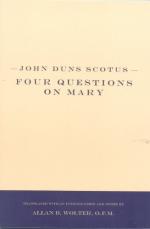|
This section contains 9,185 words (approx. 31 pages at 300 words per page) |

|
SOURCE: Frank, William A. “Duns Scotus's Concept of Willing Freely: What Divine Freedom beyond Choice Teaches Us.” Franciscan Studies 42, no. 20 (1982): 68-89.
In the following essay, Frank analyzes the conjunction of freedom and necessity in Scotus's understanding of divine will.
The claim that God enjoys a volition that is simultaneously free and necessary challenges the standard meaning of willing freely that is anchored in the condition of a choice between alternatives.1 It has been claimed before that Duns Scotus' assertion of the compatibility of freedom and necessity in volition proves critical to a proper understanding of his voluntarism. Alluding to this teaching is one way of fulfilling the obligation encumbent on a reader of Duns Scotus to counter an entrenched tendency in the received history of philosophy that sees in Scotus' doctrine of the free will the origins of a prevailing modern notion of liberty as a fundamental arbitrariness...
|
This section contains 9,185 words (approx. 31 pages at 300 words per page) |

|


